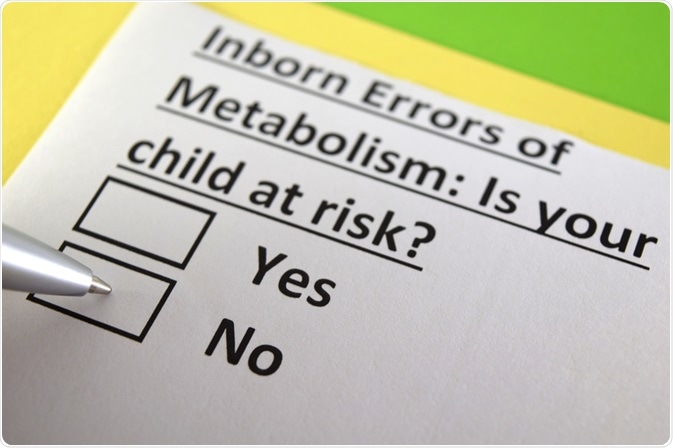Inborn errors of metabolism are a group of genetic disorders caused by abnormal functioning of specific proteins related to metabolic pathways.

Image Credit: Yeexin Richelle/Shutterstock.com
What are inborn errors of metabolism?
Inborn errors of metabolism are primarily associated with the improper digestion of food items and defects in the storage of carbohydrates, fatty acids, and proteins, leading to abnormal accumulation of metabolites and reduced production of energy.
These diseases are caused by mutations in genes that encode enzymes, membrane transporters, and other functional proteins related to various metabolic pathways. They are mostly inherited in an autosomal recessive manner, and rarely in autosomal dominant and X-linked manners.
Although individual inborn error of metabolism is very rare, collectively they are very common, affecting 1 in 2500 infants at birth. There are different types of inborn errors of metabolism, including maple sugar urine disease, fructose intolerance, galactosemia, and phenylketonuria. These disorders can be identified through newborn screening tests.
Classification of inborn errors of metabolism
Inborn errors of metabolism are mainly categorized depending on their onset, primary signs and symptoms, organs/systems affected, and disease presentation (acute/chronic).
In organic acidemias, metabolism of carbohydrates, proteins, and fats is impaired, leading to metabolic acidosis with ketosis, increased lactate level, and hyperammonemia. Common examples are methylmalonic acidemia and multiple carboxylase deficiencies.
In fatty acid oxidation disorders, mitochondrial beta-oxidation pathway is disrupted. Also, disruption of the carnitine transport pathway can occur, leading to abnormal fatty acid transportation. These disorders are characterized by hypoglycemia with hypoketosis, cardiomyopathy, and hyperammonemia. Common examples are short, medium, and long-chain acyl-CoA dehydrogenase deficiency.
Aminoacidopathies are caused by deficiencies in enzymes related to amino acid metabolism. In some cases, the characteristics of aminoacidopathies are similar to that of organic acidemias; however, in general, the characteristics are non-specific and heterogeneous in nature. Common examples are phenylketonuria, maple syrup urine disease, tyrosinemia, and homocystinuria.
carbohydrate metabolism disorders are primarily caused by improper metabolism of carbohydrates, abnormal glycogen synthesis, or impaired gluconeogenesis. These disorders are characterized by hypoglycemia, lactic acidosis or ketosis, and hepatosplenomegaly. Common examples are fructose intolerance, galactosemia, fructose 1,6-diphosphatase deficiency, and glycogen storage disorders.
In lysosomal storage disorders, lysosomal accumulation of glycoproteins, glycolipids, and glycosaminoglycan occurs in many tissues. These disorders are characterized by neurodegeneration, organomegaly, and facial coarseness. Common examples are Niemann-Pick disease, Gaucher’s disease, and mucopolysaccharidosis.
Lactic acidosis is characterized by abnormal accumulation of lactic acid in the blood. The condition is caused by a lower oxygen level in the tissues that triggers the production of lactic acid. Common examples are pyruvate dehydrogenase deficiency and cytochrome oxidase deficiency.
Urea cycle disorders occur when nitrogen produced from protein metabolism cannot be converted to urea, leading to abnormal accumulation of ammonia in the blood. These disorders are characterized by hyperammonemia and respiratory alkalosis. Common examples are ornithine transcarbamylase deficiency, citrullinemia, and argininosuccinic aciduria.
Peroxisomal disorders occur due to defect in peroxisomal enzymes or improper biogenesis of peroxisomes. Clinical characteristics are generally similar to lysosomal storage disorders. Common examples are Zellweger syndrome and neonatal adrenoleukodystrophy.
What are the common symptoms of inborn errors of metabolism?
The signs and symptoms of inborn errors of metabolism depend on specific conditions. Some common symptoms include weight loss, lack of growth in infants and children, lack of energy, severe fatigue, low blood glucose level, high blood ammonia or acid level, impaired liver and stomach functions, vomiting, diarrhea, development delays, seizures, and other central nervous system defects.
How these disorders are diagnosed?
At birth, newborn screening tests are performed to evaluate possible signs of inborn errors of metabolism in infants. Because some conditions are associated with a variety of symptoms, doctors may ask for multiple tests. if abnormalities are found, further tests are carried out to confirm the diagnosis.
To consider the presence of inborn errors of metabolism, there are guidelines for primary care physicians. These are as follows:
- Differential diagnosis of sepsis, toxic ingestion, or anoxic encephalopathy
- Persistence of symptoms even after treating commonly suspected conditions
- Failure to have a definitive diagnosis using common lab tests
- Acute or chronic presentation of the condition; recurrent or progressive disease at any age
- Disease occurrence even without a family history of genetic or metabolic disorder
- Newborn death from unrecognized causes
To confirm the diagnosis, lab tests are often done to analyze the level of ammonia or other components in the blood or urine. In some conditions, tests are also done on tissues isolated from the liver, muscle, bone marrow, brain, or skin.
How to treat inborn errors of metabolism?
Treatments of inborn errors of metabolism depend on a specific condition. In some severe cases, patients may require respiratory and cardiac support systems. Because it is not initially possible to determine which metabolic pathway is disrupted, it is important to stop all kinds of oral intakes. To fulfill the energy demand, these patients are provided with puro glucose (8 – 10 mg/kg/min) intravenously.
If there are no fatty acid oxidation defects, intravenous lipid solutions can be given. No protein should be administered for 48 – 72 hours, and until any defects in protein, metabolism pathways are ruled out. Patients with hyperglycemia should be administered with insulin.
It is also important to remove toxic metabolites that are accumulated in the blood. For example, hemodialysis can be done in case of severe hyperammonemia. Patients with enzyme deficiencies can be benefited from enzyme replacement therapies.
Further Reading
Last Updated: Mar 10, 2023